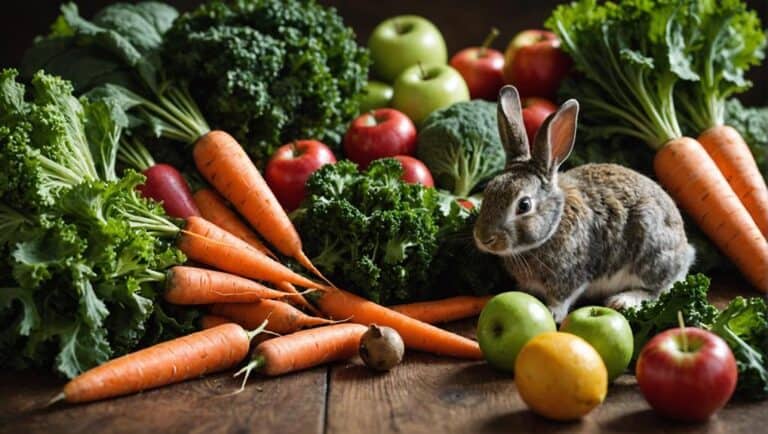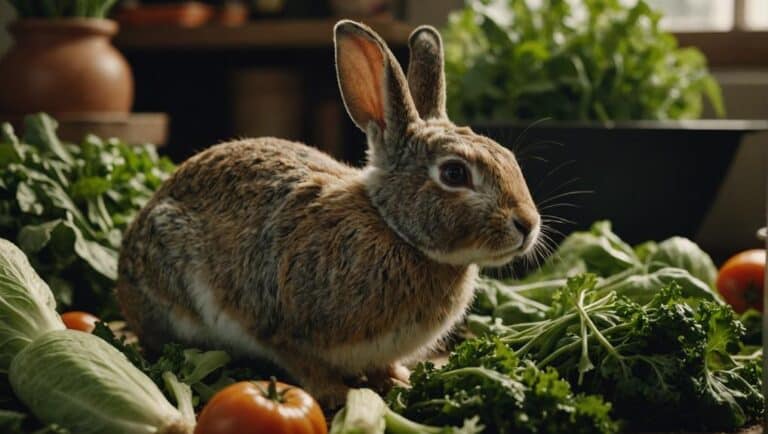You might not realize that certain everyday foods can be silently wreaking havoc on your pet's dental health. While you may think you're providing a treat, those high-carb snacks and sugary morsels can lead to serious issues like plaque buildup and gum disease. It's essential to understand which foods to avoid to keep your furry friend's teeth in best condition. Explore the surprising culprits that might be compromising your pet's smile and discover how simple dietary changes can make a significant difference.
Contents
Wheat and Its Effects
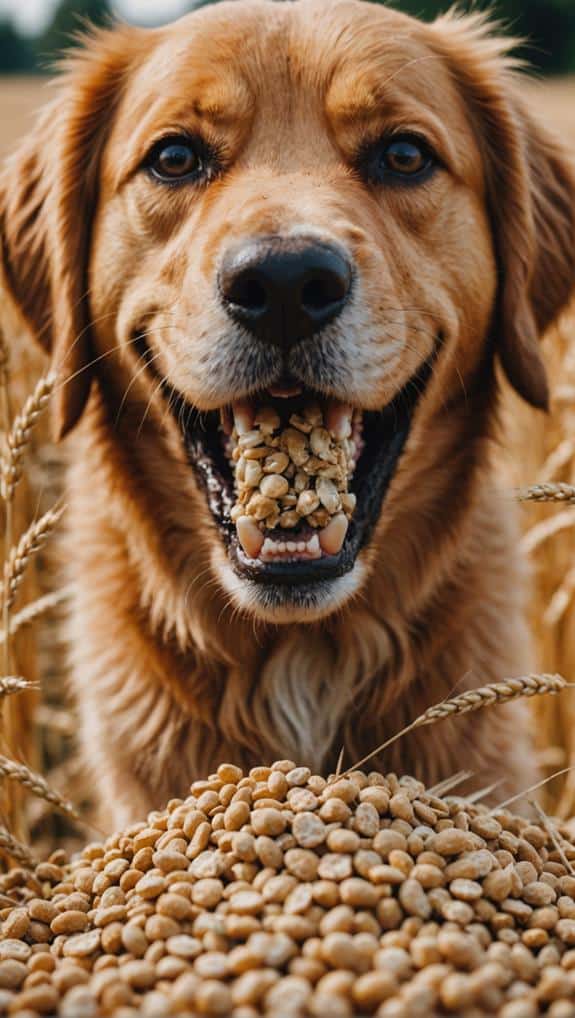
Wheat can greatly impact your pet's dental health and overall well-being. As a complex carbohydrate, wheat converts into sugars, creating an acidic environment in your dog's mouth. This acidity can lead to considerable dental issues, as the sugars interact with oral bacteria, resulting in acid formation that damages teeth and gums.
High consumption of wheat can contribute to the buildup of plaque and tartar, increasing the risk of gum disease and other dental problems in dogs. Additionally, a high-fiber diet is essential for maintaining overall gut health, which is also vital for proper dental health essential for digestion.
Moreover, wheat-based products may not only affect dental health but can also cause potential intestinal issues. These gastrointestinal complications can further complicate your dog's overall health, making it vital to evaluate what goes into their diet.
By avoiding wheat in your dog's diet, you can notably reduce the risk of developing dental problems. This proactive approach supports better oral hygiene and promotes overall health in your pet. Keeping your dog's diet free from wheat may lead to improved dental health, reducing the likelihood of plaque and tartar accumulation.
Prioritizing your dog's dietary choices is essential for their long-term well-being and happiness.
Hard Treats and Dental Risks
While many pet owners believe hard treats are a safe and enjoyable option for their dogs, they can pose significant risks to dental health. The tough texture of hard treats can lead to broken or chipped teeth, which may result in painful dental problems.
Frequent chewing on these treats increases the risk of cavities, as the stress placed on your dog's teeth can be substantial. Additionally, some hard treats, including bones, can splinter, exacerbating the risk of severe dental damage.
This contradicts the common belief that they promote oral health. It's essential for you to understand that not all hard treats deliver the dental benefits they claim; many can actually contribute to plaque and tartar buildup due to their composition.
Be vigilant in monitoring your dog's dental care, as signs of tooth injuries may be subtle and easily overlooked. Regularly check your dog's teeth and gums for any abnormalities.
If you notice any signs of discomfort or dental issues, consult your veterinarian promptly. Prioritizing your dog's dental health will help guarantee a long, happy life for your furry companion.
Sticky Foods to Avoid
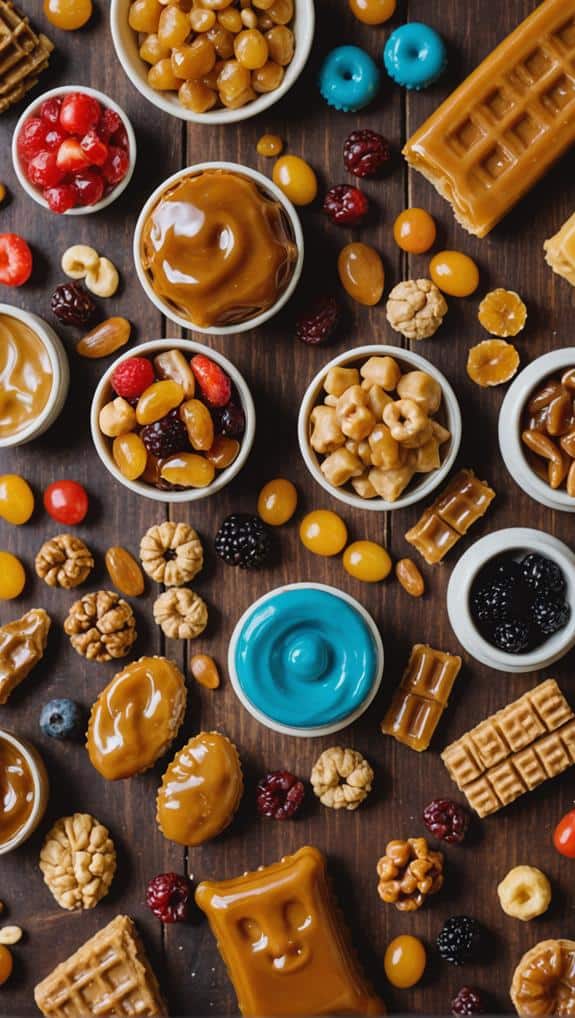
Sticky foods are often deceptively appealing for pets, but they can lead to serious dental issues. Common sticky treats like peanut butter and honey tend to cling to your dog's teeth, promoting plaque buildup and increasing the risk of tooth decay.
Similarly, soft human foods such as cheese and bread can become lodged between teeth, leading to significant plaque accumulation.
The high sugar content found in many sticky foods creates an acidic environment in the mouth, which can further damage your dog's teeth and gums. This combination of factors heightens the likelihood of dental problems, necessitating more frequent dental care routines to maintain proper dental hygiene.
It's vital to limit the consumption of sticky treats, reserving them for special occasions. When you do offer these foods, make sure you follow up with appropriate dental hygiene practices, such as brushing your pet's teeth or providing dental chews.
Leftovers and Their Dangers
Avoiding leftovers is crucial for maintaining your pet's overall health and well-being. Feeding your dog table scraps disrupts their carefully balanced diet, potentially leading to nutritional deficiencies or excesses that impact their dental health.
Soft human foods, particularly cheese and bread, can stick to your pet's teeth, considerably contributing to plaque buildup and increasing the risk of tooth decay.
Additionally, many leftovers contain high sugar content, which interacts with oral bacteria to create an acidic environment that damages teeth and gums. This acidic environment can lead to further complications, such as dental erosion and gum disease. Foods with high acidity, like citrus fruits, worsen these issues when consumed frequently as table scraps.
Moreover, regularly providing leftovers can lead to obesity, which is linked to several health issues that indirectly affect your dog's dental health and overall well-being.
Instead of offering leftovers, consider healthier, pet-safe alternatives that support their nutritional needs while promoting strong teeth and gums.
Sweets and Sugar Intake
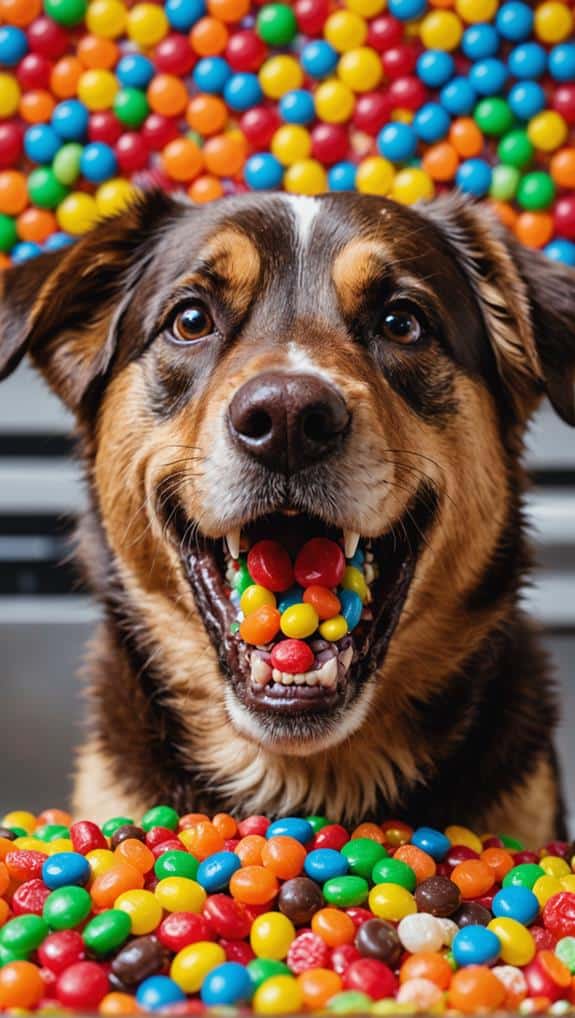
Excessive sugar consumption can considerably harm your dog's dental health, leading to cavities and gum disease.
Sharing human sweets not only increases the risk of obesity but also creates an acidic environment in their mouth, promoting plaque buildup.
To guarantee your pet's well-being, it's essential to choose healthier treats made with natural ingredients instead of sugary options.
Impact of Sugar Consumption
Sugar consumption in dogs poses crucial risks to their dental health and overall well-being. High sugar intake can lead to tooth cavities as sugar interacts with harmful bacteria in your dog's mouth, producing acids that damage teeth and gums.
While dogs may have a lower risk of cavities compared to humans, their dental structure is still susceptible to the effects of excessive sugar and fat, necessitating careful dietary choices.
Sweets, including human desserts, greatly increase the likelihood of plaque buildup, which can lead to tartar formation. Foods such as candy, cakes, and soft drinks should be strictly avoided in your dog's diet to prevent dental disease, painful gum issues, and even potential tooth loss.
The presence of sugar not only promotes dental problems but can also contribute to obesity and its related complications.
Maintaining a balanced diet with minimal sugar is essential for your dog's dental health and overall vitality. By prioritizing a diet low in sugar, you can help protect your pet from the harmful consequences of sugar consumption and support their long-term well-being.
Harmful Human Foods
Many pet owners unknowingly jeopardize their dog's health by sharing harmful human foods, particularly sweets. Sugary treats, such as candies and baked goods, can greatly compromise your dog's dental health.
While dogs are less prone to cavities than humans, excessive sugar intake still poses a risk. High sugar consumption can lead to plaque buildup, resulting in tooth decay and gum disease if not addressed appropriately.
Feeding your dog sweets contributes to the likelihood of developing serious dental issues, making it important to prioritize a balanced diet. A diet rich in natural, low-sugar ingredients guarantees your pet's long-term dental health and reduces the risk of painful complications like gum disease.
It's essential to recognize that the dental structure of dogs doesn't eliminate the risk of dental problems associated with sugary diets. As a result, steering clear of human desserts and maintaining a focus on healthful alternatives is fundamental.
Ice and Dental Health
Ice may seem like a harmless way to keep your pet cool during hot weather, but it can pose serious risks to their dental health.
While many dog owners enjoy giving their pets ice cubes as a treat, this seemingly innocuous act carries significant dangers. The hardness of ice can lead to fractured or broken teeth when chewed, particularly stressing the molars, which are more susceptible to injuries.
Chewing on hard objects like ice increases the risk of dental trauma, similar to the hazards posed by rocks and excessively hard chew toys. Dogs can sustain serious tooth injuries from ice chewing, making it a high-risk option for hydration.
Instead of offering ice, consider providing fresh water, which guarantees your dog stays hydrated without compromising their dental health.
Prioritizing your dog's dental health is essential for their overall well-being.
By recognizing the risks associated with giving your pet ice, you can make informed choices that protect their teeth.
Always opt for safer alternatives that support both hydration and dental integrity, guaranteeing your furry friend enjoys a healthy, happy life.
Harmful Chew Items
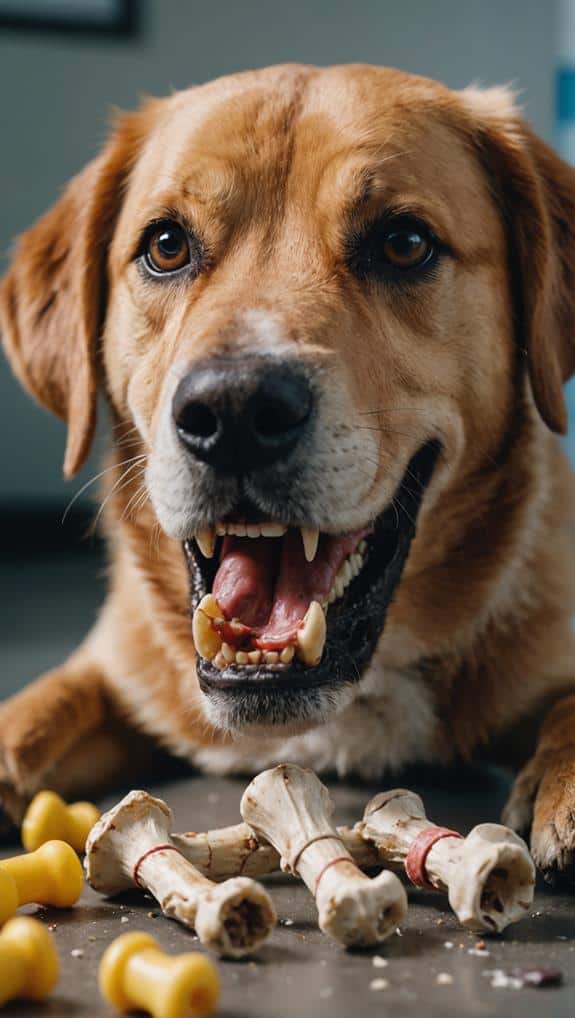
A variety of chew items can pose significant risks to your pet's dental health. Hard chew items, including animal bones and antlers, are particularly dangerous. Their rigidity can lead to dental trauma, such as fractures and broken teeth.
Many pet owners mistakenly believe that certain dental bones and hard-plastic chews offer oral health benefits. However, these items often fail to deliver the promised results and can instead harm your dog's teeth. Additionally, it's important to take into account that some foods, like avocado, can also be harmful to pets, leading to serious health issues; for example, avocado risks for rabbits highlight the dangers of certain dietary choices.
Chewing on rocks or other extremely hard objects poses an even greater risk, potentially resulting in serious oral injuries. It's essential to recognize that many dental chews marketed for their supposed effectiveness lack scientific backing and may not be a safe choice for all dogs.
To protect your pet, prioritize safe chew items specifically designed to be gentle on their teeth. Look for products that have been tested for safety and proven to support oral health without causing damage.
Processed Foods Concerns
While you might find processed foods convenient for your pets, they can pose serious health risks, particularly concerning dental health. Many commercial dry kibbles contain binding agents and fillers, such as corn, wheat, and soy, which offer little nutritional value. These ingredients can contribute to plaque and tartar buildup, leading to more severe dental issues over time, especially in pets like rabbits that experience lifelong teeth growth and require continual dental care.
Additionally, understanding the significance of regular veterinary check-ups can further enhance your pet's dental health.
Moreover, processed treats often have a high sugar content. This sugar can create an acidic environment in your pet's mouth, promoting bacterial growth that leads to dental decay. Sticky ingredients, like peanut butter or honey, can also stick to the teeth, exacerbating plaque accumulation. This accumulation not only harms your pet's teeth but can also affect their gums, resulting in painful conditions.
Regularly feeding processed foods may disrupt a balanced diet, potentially contributing to obesity. When your pet is overweight, their overall health suffers, including their dental condition. Additionally, processed foods often lack the necessary nutrients that support optimal health, leading to deficiencies that can impact your pet’s immune system and vitality. Furthermore, an imbalanced diet can lead to common digestive problems in pets, such as diarrhea and constipation, which further exacerbate their discomfort. To maintain your pet’s health, it’s crucial to provide a well-rounded diet that includes high-quality ingredients and appropriate portions.
To protect your pet's teeth, it's essential to limit processed foods and consider healthier alternatives. By doing so, you're not only ensuring their dental health but also enhancing their overall well-being.
Foods That Clean Teeth
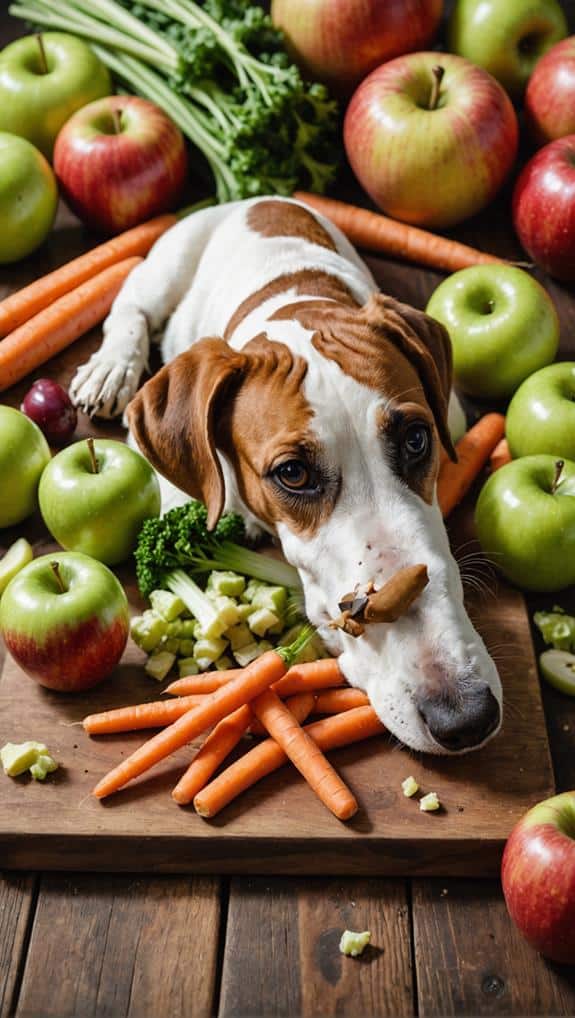
Many pet owners mightn't realize that certain foods can play a significant role in maintaining their pets' dental health. Incorporating healthy dog treats into your dog's diet can effectively contribute to cleaner teeth. For example, apples are a fibrous snack that naturally scrubs away plaque as dogs chew.
Similarly, crunchy carrots can actively scrape teeth clean, promoting better oral hygiene. Celery, another excellent option, is high in fiber and assists in reducing plaque buildup, making it a beneficial snack for dental health.
Kelp, rich in bacteria-fighting properties, supports a healthier oral environment and can be included in raw foods for added benefits.
Fruits like blueberries and strawberries also contain natural enzymes that combat bad bacteria, further promoting cleaner teeth for your dogs. By selecting foods that contain these beneficial properties, you're not only providing your pet with nutritious options but also enhancing their dental health.
Adopting these practices can lead to cleaner dogs, reducing the risk of dental issues down the line. Regularly incorporating these foods into your pet's diet fosters a proactive approach to oral care.
Final Thoughts
To maintain your pet's dental health, it's essential to avoid certain foods that can cause significant damage. Did you know that nearly 80% of dogs show signs of dental disease by age three? This statistic highlights the importance of being mindful of their diet. By steering clear of hard, sticky, and sugary treats, and opting for crunchy vegetables instead, you can help prevent plaque buildup and guarantee your furry friend enjoys a healthier mouth and happier life.

